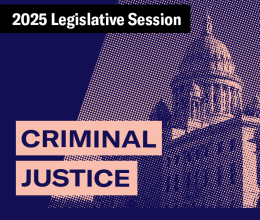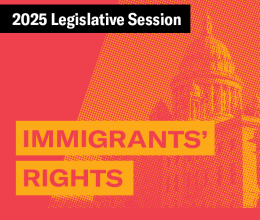The ACLU of RI today announced the settlement of a lawsuit that will ensure that no shelter operating on State property is required to turn away vulnerable homeless Rhode Islanders seeking shelter even though beds are available. The settlement reached today ended a lawsuit filed in U.S. District Court by ACLU of RI volunteer attorneys Lynette Labinger and John MacDonald challenging a state law, slated to take effect last January and specifically aimed at Harrington Hall in Cranston, which limited the number of registered sex offenders that could stay there to 10% of the shelter’s population, which amounts to 11 people.
The lawsuit called Harrington Hall “the shelter of last resort for male homeless registered sex offenders in Rhode Island, whose only other option is to sleep or camp on the streets,” and noted that the facility “routinely provided overnight shelter to many more than 11 registered sex offenders” without experiencing “any increase or experience of re-offenses.”
In challenging the validity of the law, the suit made a number of other points:
- Increasing homelessness and transience of this population would only “make it more difficult for law enforcement officials to monitor” them,
- By forcing them into transience, “the 10% Restriction increases their lack of stability and access to community and services, increasing the risk to public safety and the risk of re-offense and recidivism,” and, most urgently,
- Forcing them into “unsheltered homelessness, particularly during the winter months, imposes life-threatening conditions upon the Plaintiffs.”
After meeting with federal court Chief Judge William Smith last January, the State agreed to put the requirement on hold during the litigation. Under the settlement agreement filed today, the parties agreed that, in implementing the statute, shelter providers will not be deemed to have exceeded the limitations so long as the shelter operator reports to the local police the names of the individuals being housed overnight and that available alternative shelters or housing for the individuals were explored. Harrington Hall, run by Crossroads Rhode Island, has followed this practice throughout the pendency of the litigation.
Statements from lawsuit participants and homeless rights’ advocates follow below:
Laura Jaworski, Executive Director, House of Hope CDC, a nonprofit homeless services provider: “We are very pleased with the news of the ‘10% restriction’ settlement. It is critical that this decision comes before the deep winter months set in, so that all who are experiencing homelessness are able to access emergency shelter, regardless of registration status. Access to emergency shelter allows social service and law enforcement agencies to operate within their areas of expertise - to provide housing and community-based monitoring, respectively, and in a much safer, effective and humane manner.”
Megan Smith, homeless rights advocate at the House of Hope CDC: “This decision affirms the right of all people to access life-sustaining shelter and the resources that can come with it. It is our hope that this favorable resolution underscores the fact that the same policies that provide for the safety of people who have to register as sex offenders also provide for the safety of our communities.”
Barbara Freitas, director of the Rhode Island Homeless Advocacy Project (RIHAP), a plaintiff in the suit: “We at the R.I. Homeless Advocacy Project are very pleased with the outcome of the lawsuit. While it is a victory in many respects, we cannot forget that there are many more problems like this that still need to be addressed.”
Steven Brown, executive director of the ACLU of RI: “This law had been scheduled to take effect on what turned out to be one of the coldest days of the year this past January. We are pleased that we were able to get this suit resolved just as winter returns so that individuals don’t have to face the cruel prospect of being turned out into the cold for no legitimate reason.”
Full text of the settlement can be found here.
More information on the lawsuit, RIHAP v. Raimondo, can be found here.



